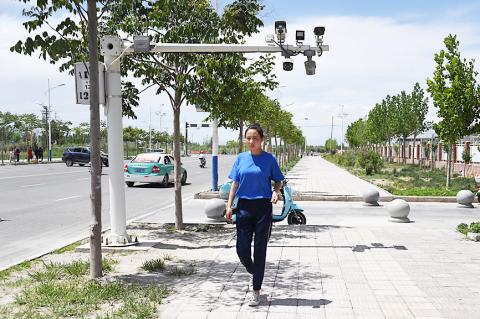Uighur activists on Tuesday said that they have documented nearly 500 camps and prisons run by China to detain members of the ethnic group, alleging that Beijing could be holding far more than the commonly cited figure of 1 million people.
The Washington-based East Turkistan National Awakening Movement, a group that seeks independence for the Xinjiang region, gave the geographic coordinates of 182 suspected “concentration camps” where Uighurs are allegedly pressured to renounce their culture.
Researching imagery from Google Earth, the group said it also spotted 209 suspected prisons and 74 suspected labor camps, for which it would share details later.

Photo: AFP
“In large part, these have not been previously identified, so we could be talking about far greater numbers” of people detained, movement director of operations Kyle Olbert said.
“If anything, we are concerned that there may be more facilities that we have not been able to identify,” he told a news conference in Washington.
Anders Corr, an analyst who formerly worked in US intelligence and who advised the group, said that about 40 percent of the sites had not been previously reported.
Rights advocates have generally estimated that China is detaining more than 1 million Uighurs and members of other predominantly Muslim ethnicities, but US Assistant Secretary of Defense for Asian and Pacific Security Affairs Randall Schriver in May said that the figure was “likely closer to 3 million citizens” — an extraordinary number in a region of about 20 million people.
Olbert said that archive imagery from alleged camp sites showed consistent patterns — steel and concrete construction over the past four years, along with security perimeters.
He said that the group tried to verify the nature of each site with on-the-ground accounts, but declined to give greater detail, citing the need to protect sources.
The Chinese Ministry of Foreign Affairs said that the allegations were “baseless.”
“East Turkestan organizations outside China have long conducted activities harming China’s national security,” ministry spokesman Geng Shuang (耿爽) said at a regular media briefing in Beijing yesterday.
He said it was “clear for all to see” that China’s policies in Xinjiang had promoted “ethnic unity and social harmony.”
Activists and witnesses say China is using torture to forcibly integrate Uighurs into the Han majority, including pressuring Muslims to give up tenets of their faith — such as praying, and abstaining from pork and alcohol.
Olbert described China’s policy as “genocide by incarceration,” fearing that Uighurs would be held indefinitely.
“It’s like boiling a frog. If they were to kill 10,000 people a day, the world might take notice, but if they were just to keep everyone imprisoned and let them die off naturally, perhaps the world might not notice. I think that’s what China is banking on,” Olbert said.
China has justified its policy after first denying the existence of the camps, saying it is providing vocational training and coaxing Muslims away from extremism.
The US has likened China’s treatment of Uighurs to Nazi Germany’s concentration camps, but Beijing has faced limited criticism outside the West.

SECURITY: As China is ‘reshaping’ Hong Kong’s population, Taiwan must raise the eligibility threshold for applications from Hong Kongers, Chiu Chui-cheng said When Hong Kong and Macau citizens apply for residency in Taiwan, it would be under a new category that includes a “national security observation period,” Mainland Affairs Council (MAC) Minister Chiu Chui-cheng (邱垂正) said yesterday. President William Lai (賴清德) on March 13 announced 17 strategies to counter China’s aggression toward Taiwan, including incorporating national security considerations into the review process for residency applications from Hong Kong and Macau citizens. The situation in Hong Kong is constantly changing, Chiu said to media yesterday on the sidelines of the Taipei Technology Run hosted by the Taipei Neihu Technology Park Development Association. With

CARROT AND STICK: While unrelenting in its military threats, China attracted nearly 40,000 Taiwanese to over 400 business events last year Nearly 40,000 Taiwanese last year joined industry events in China, such as conferences and trade fairs, supported by the Chinese government, a study showed yesterday, as Beijing ramps up a charm offensive toward Taipei alongside military pressure. China has long taken a carrot-and-stick approach to Taiwan, threatening it with the prospect of military action while reaching out to those it believes are amenable to Beijing’s point of view. Taiwanese security officials are wary of what they see as Beijing’s influence campaigns to sway public opinion after Taipei and Beijing gradually resumed travel links halted by the COVID-19 pandemic, but the scale of

A US Marine Corps regiment equipped with Naval Strike Missiles (NSM) is set to participate in the upcoming Balikatan 25 exercise in the Luzon Strait, marking the system’s first-ever deployment in the Philippines. US and Philippine officials have separately confirmed that the Navy Marine Expeditionary Ship Interdiction System (NMESIS) — the mobile launch platform for the Naval Strike Missile — would take part in the joint exercise. The missiles are being deployed to “a strategic first island chain chokepoint” in the waters between Taiwan proper and the Philippines, US-based Naval News reported. “The Luzon Strait and Bashi Channel represent a critical access

Pope Francis is be laid to rest on Saturday after lying in state for three days in St Peter’s Basilica, where the faithful are expected to flock to pay their respects to history’s first Latin American pontiff. The cardinals met yesterday in the Vatican’s synod hall to chart the next steps before a conclave begins to choose Francis’ successor, as condolences poured in from around the world. According to current norms, the conclave must begin between May 5 and 10. The cardinals set the funeral for Saturday at 10am in St Peter’s Square, to be celebrated by the dean of the College